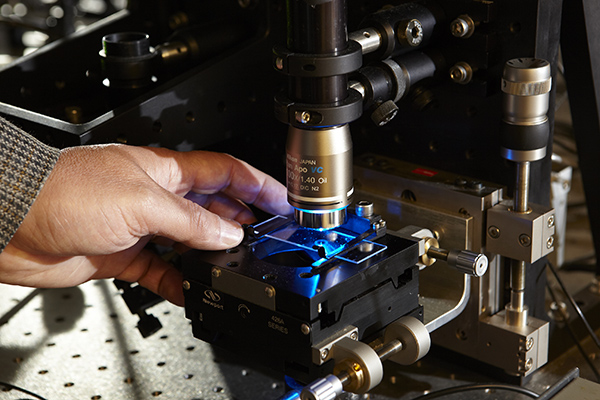One preeminent goal of the UWM Physics graduate education is to train and develop creative research scientists. The high faculty-to-student ratio encourages close social and professional contact between graduate students and faculty. To hone solid research skills and protocols, students are provided with research opportunities early in their careers. Because of this teaching approach, the employment record of UWM Physics students has been very good, with graduates typically obtaining faculty and postdoctoral positions in academia as well as research and development positions in industry.
Because many students go on to careers that involve teaching physics at universities and colleges throughout the world, the graduate faculty has devised a program that helps encourage the development of solid teaching skills. New teaching assistants attend a one-semester seminar, “The Art and Science of Teaching Physics.” This seminar is led by experienced TAs and by some of the best teachers among our faculty, which results in talented UWM graduate students that frequently teach summer courses on campus and at nearby colleges.

Transmission imaging with microscope.
The physical plant of the Kenwood Interdisciplinary Research Complex and the Physics buildings feature excellent laboratory and computing facilities associated with each of the research groups as well as sophisticated instructional laboratories with universal access to an array of computers. UWM is a member of the Internet2 Project, a nationwide effort to establish a high-speed high-bandwidth network and is an Academic Affiliate of the National Center for Supercomputing Applications (NCSA) at Urbana-Champaign, which Physics maintains a fast direct link.
The UWM Physics graduate program emphasizes that a student acquire comprehensive knowledge through academic course studies while simultaneously building depth and intensity within the major research areas. Each new graduate student is assigned an advisor who will supervise his or her program of study until the student chooses a major professor.
Students in the MSc and PhD programs are expected to attend departmental colloquia. There also are advanced seminars and informal research group meetings that supplement formal course work and expose the student to recent advances in physics. Each student should be aware of the research activities of every faculty member and is encouraged to contact each of the faculty to investigate research possibilities. The graduate faculty strongly encourages students to begin research work early in their graduate studies. The earliest research experiences may not be permanent, but will certainly be a fruitful experience.
A student holding a regular teaching assistantship is required to complete at least 6 credits of graduate work each semester. A student holding a fellowship or research assistantship is required to carry a minimum of 8 credits a semester until the candidacy requirements have been completed.
Entering graduate students should have laboratory experience and knowledge of the material in undergraduate courses in mechanics, thermodynamics, electricity and magnetism, and quantum physics. A student’s mathematical background should include advanced calculus, vector analysis, ordinary and partial differential equations, linear algebra, and complex analysis. Students lacking adequate mathematical preparation should enroll in Physics 501-502 (Mathematical Models of Physical Problems) in their first year of graduate study.